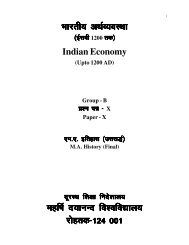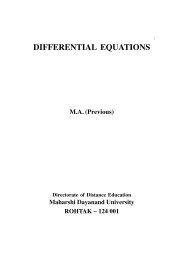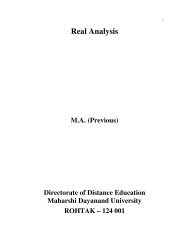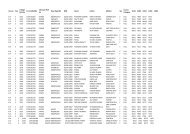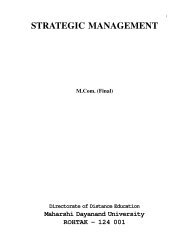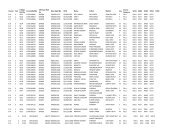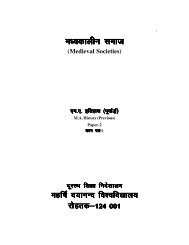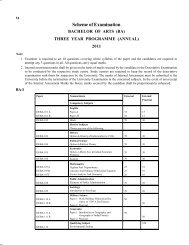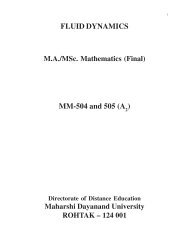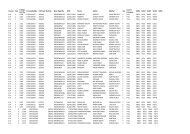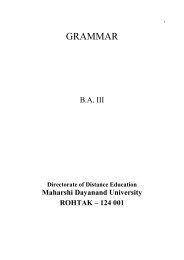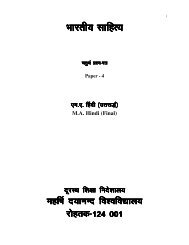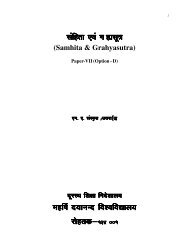Advanced Abstract Algebra - Maharshi Dayanand University, Rohtak
Advanced Abstract Algebra - Maharshi Dayanand University, Rohtak
Advanced Abstract Algebra - Maharshi Dayanand University, Rohtak
Create successful ePaper yourself
Turn your PDF publications into a flip-book with our unique Google optimized e-Paper software.
UNIT-IV 107<br />
The possibility φ(r) < φ(a) is ruled out in respect of the choice of a. Therefore, r = 0 and we have<br />
b = aq<br />
I = (a)<br />
and I is accordingly a principal ideal.<br />
Note :- Since P.I.D. is U.F.D, it follows that Euclidean domain is unique factorisation domain.<br />
* We know that a polynomial domain F[x] over a field F is a principal ideal domain, therefore F[x] is<br />
also a unique factorisation domain.<br />
Definition. Let D[x] be a polynomial ring over a unique factorisation domain D and let f(x) = a 0 + a 1 x +<br />
… + a n x n be a polynomial belonging to D[x]. Then f(x) is called primitive if the greatest common<br />
divisor of a 0 , a 1 ,…, a n is 1.<br />
Definition. The content of the polynomial f(x) = a 0 + a 1 x + …. a n x n is the greatest common divisor of<br />
a 0 , a 1 ,…, a n .<br />
If a polynomial f(x) = c g(x) where g(x) is primitive polynomial, then c is called content of f(x).<br />
Definition. A polynomial p(x) is F[x] is said to be irreducible over F if whenever p(x) = a(x) b(x) ∈<br />
F[x] then one of a(x) or b(x) has degree zero (i.e. is a constant).<br />
Definition. Let D[x] be the polynomial ring over a unique factorisation domain D. Then a polynomial<br />
f(x) ∈ D[x] is called primitive if the set {a 0 , a 1 ,.., a i , … a n } of coefficients of f(x) has no common factor<br />
other than a unit. For example x 3 −3x+1 is a primitive member of I[x] but the polynomial 3x 2 −6x +3 is<br />
not a primitive member of I[x] since in the later case 3 is a common factor.<br />
* f(x) ∈ D[x] is called primitive if the g.c.d. of a 0 , a 1 ,…, a n is 1. Every irreducible polynomial is<br />
necessarily primitive but the converse need not be true. For example the primitive polynomial x 2 + 5x +<br />
6 is reducible since x 2 + 5x + 6 = (x+2) (x+3).<br />
Lemma 1. The product of two primitive polynomials is primitive.<br />
Proof. Let f(x) = a 0 + a 1 x + a 2 x 2 + … a m x m and g(x) = b 0 + b 1 x + b 2 x 2 + … b n x n be two primitive<br />
polynomials belonging to D[x]. Let<br />
h(x) = f(x) g(x)<br />
= c 0 + c 1 x + c 2 x 2 x … + c m+n x m+n<br />
Let if possible, a prime element p be a common divisor of each of the coefficients of the product f(x)<br />
g(x).<br />
Also let a i and b j be the first coefficients of f(x) and g(x) which are not divisible by p. Then<br />
c i+j = a i b j + a i−1 b j+1 + a i−2 b j+2 + … + a 0 b i+j + a i+1 b j−1 + a i+2 b j−2 + … a i+j b 0<br />
a i b j = c i+j − (a i−1 b j+1 + a i−2 b j+2 + … ) − (a i+1 b j−1 + a i+2 b j−2 + …)<br />
Since p is a divisor of each of the terms on the right, we have<br />
p | a i b j<br />
p | a i or p | b j<br />
so that we arrive at a contradiction. Hence the Lemma.<br />
Lemma 2. If f 1 (x) and f 2 (x) are two primitive members of D[x] and are also associates in K[x], then they<br />
are also associates in D[x], K being the quotient field of the domain D.<br />
Proof. Since f 1 (x) and f 2 (x) are associates in K[x], we have



